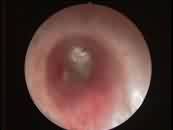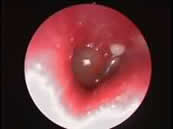One of the most common health problems in children is ear infection.
It is very disturbing to the child resulting in sleeping and feeding problems. They may even cry excessively for unknown reasons. Most children have at least one middle ear infection before they are 2 years old.
What are the predisposing factors?
There are 2 types:
- Otitis media is the ear infection, which happens when viruses, bacteria or fungus gets inside the eustachian tube (a connection from the back of the nose to the middle ear).
- Otitis externa is the ear infection that happens at the external ear canal.

Otitis externa
What are the predisposing factors?
- Repeated respiratory tract infections.
- Siblings in day care centres.
- Bottle feeding instead of breastfeeding.
- Passive smoking.
- Enlarged adenoids.
- Cleft palate.
- Allergy make a child more vulnerable to ear infections.
How does one know if a child has an ear infection?
It is common for a child to have ear infection after catching a common cold, flu or other types of respiratory infections.
Common symptoms are:
- Pain in the ears.
- Irritable or restless.
- Sleeping disturbances.
- Tug or pull at their ears.
- Ear discharge (fluid from the middle ear).
- Reduced appetite.
- Nasal discharge.
- Crying at night when lying down.
- Lack of response to quiet sounds.

Acute otitis media
Are there any complications that may result from an ear infection?
Most children recover completely but some may develop:
- Chronic ear discharge.
- Reduced hearing.
- Learning difficulty especially if treatment is delayed or inadequate.
How are ear infections treated?
Consult your doctor early if there are any symptoms suggestive of an ear infection.
If diagnosis is confirmed treatment usually includes:
- Decongestant (either topical or systemic).
- Fever medicine.
- Antibiotic if bacteria is suspected to be the cause.
- Ear drop when there is discharge from the ear.
For a recurrent ear infection he may:
- Check if allergy could be the cause and manage accordingly.
- Perform an audiogram (hearing test) and tympanogram (to check movement of eardrums) at a later date.
Is there anything one can do to prevent an ear infection?
Yes, some positive actions are:
- Breastfeed your babies.
- Stay away from people who have colds to prevent from catching the infection.
- Teach children to wash their hands regularly.
- Try not to touch nose and eyes with dirty hand.
- Avoid:-
- Exposure to cigarette smoke.
- Using a pacifier.
- Bottle feeding while lying down.
- Known allergens.
Always remember ‘prevention is better than cure.
What is the long-term outcome?
Most children do not develop long term complications. As children grow bigger, the eustachian tube works better, and coughs and colds and ear infections become less common.
| Last reviewed | : | 26 April 2012 |
| Content Writer | : | Dr. Norrashidah Hj. Abd Wahab |
| : | Dr. Nor Mahani Harun | |
| Reviewer | : | Dr. Norzila bt. Mohamed Zainudin |







